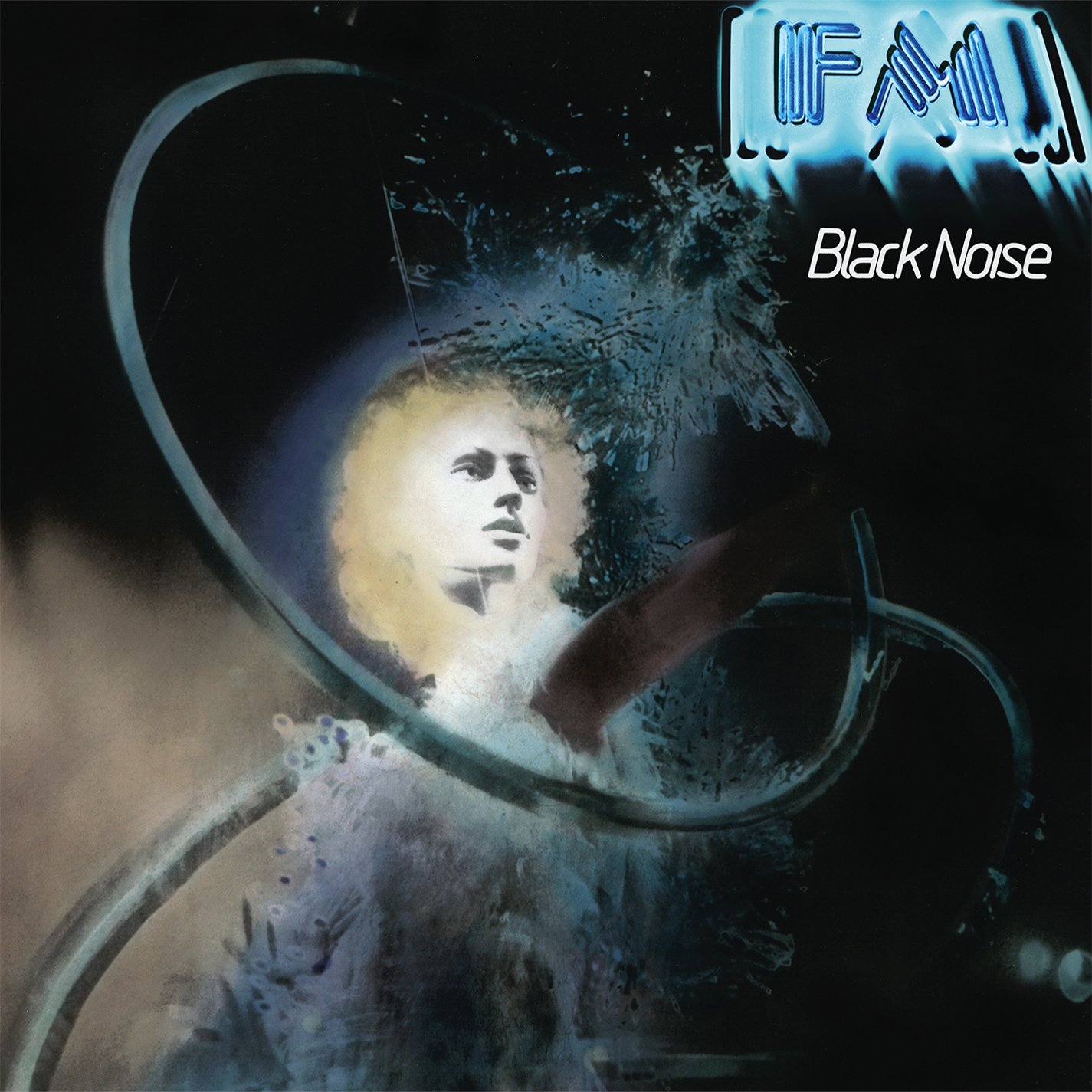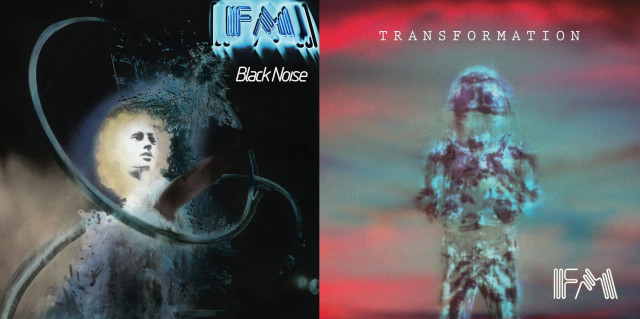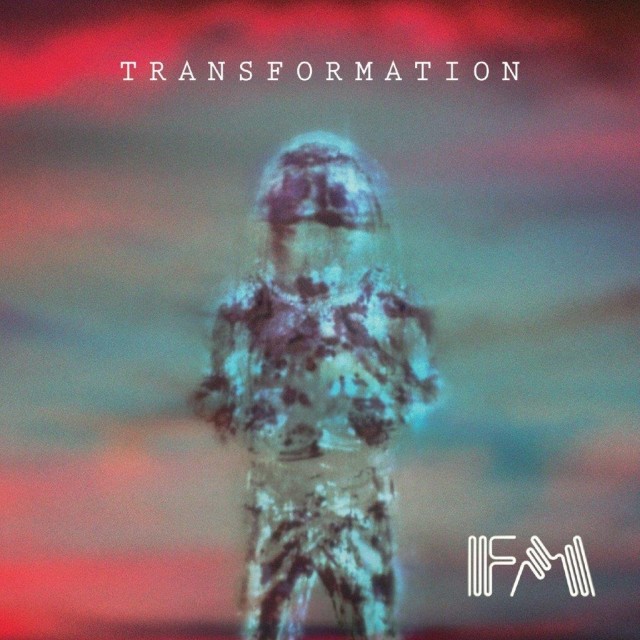Album review by Neil Hobkirk
Part One: Maple Leaf Escape Craft
For me, Part One of the FM story unfolded over FM radio. In 1980 the band’s third LP City of Fear hit record stores, and my hometown college station CIXX unveiled it by playing both sides—a practice not uncommon on FM radio in those album-friendlier days. New release in hand, I cocked ears for the band’s earlier material. I’d heard plenty by the other Canadian progressive rock trio—Rush—but these guys distinguished their similarly sci-fi-themed material through a technique fusing chamber-music intimacy with the requisite rock pyrotechnics. In place of guitar, FM showcased electric violin and mandolin, welcoming humane delicacy alongside ruthless shredding. And to my knowledge none of the guys in Rush ever performed wearing tuxedo, top hat and sunglasses.
That would be Nash the Slash, mand-handler and bow-wielder on FM’s debut disc Black Noise (1977). Directly after recording, Nash departed the trio abruptly for a solo career that steadily iconized his eccentric persona, completing his shtick with a bandage-swathed noggin. The other studio discs cut in the ’70s—long players Surveillance (1979) and City of Fear, and the EP Direct to Disc (1978)—utilized the equally gifted Ben Mink on violin and mandolin, but the mummified one would rejoin FM for two further stints.
There won’t be a fourth. Nash the Slash passed away a year ago, leaving me with a tenuous but fondly remembered point of connectivity. Before I ever knew that Nash’s real name was Jeff Plewman, I frequented his brother Tom’s excellent classical CD store The Madrigal in London, Ontario, my hometown. Earlier, on the airwaves, I had frequented Tom Plewman’s radio show Nightflight, broadcast from our local university FM station CHRW starting in 1980. During the same period when City of Fear filled my teenage head with dreams of threatening urban spaces, Nightflight supplied a nightmarish secondary soundtrack drawing on Klaus Schultze, Michael Hoenig, Tangerine Dream and other electronic innovators. The first exclusively electronic music show in Canada, Nightflight remained under Brother Tom’s command until 1987, Sundays from midnight to 1am (and continued in other hands until 2005). London’s only exclusively classical CD store, The Madrigal kept going for 26 years from 1979 to 2005, when it was succeeded for six years by L’Atelier Grigorian—eponymous offshoot of Toronto’s longstanding classical and jazz retailer. When I last spotted his name, Nash’s brother was trying to establish a classical/jazz section on the second floor of Sunrise Records at Yonge and Dundas Streets in Toronto, a store since closed for business.
FM started in Toronto as a duo: just Nash the Slash on smaller stringed instruments and glockenspiel, and Cameron Hawkins on bass guitar, synthesizers and lead vocals. Much of the Black Noise material had been developed by these two before Martin Deller joined on drums, and the 2014 CD reissue from Convexe Entertainment/Conveyor Canada includes two live recordings of Hawkins-Slash compositions—“Phasors on Stun” and “Black Noise”—performed by the trio before it hit the studio to cut the album.
Recorded in 1977, Black Noise was originally released by CBC Records in a 500-copy limited edition pressing. By the time it became widely available through Passport Records in 1978, FM had already recorded and released the EP Direct to Disc featuring replacement string wringer Mink. The original Black Noise master tapes are lost, so for this reissue a new master recording was created from a virgin vinyl copy of the album. Thanks to mastering engineer Peter J. Moore’s wizardry, the re-master’s a sonic marvel. Also available as 180 gram vinyl, it sounds terrific on CD—warm but crystal clear, vibrantly present, and with a stereo image ideally broad and deep. It’s inconceivable that the album could sound better than this! The packaging is likewise pleasing, with Paul Till’s original front cover image restored to its intended splendour and informative booklet notes by Nick Krewen.
But the music provides the ultimate pleasure. Album opener “Phasors on Stun” established the band FM’s radio viability—and not just on the FM bandwidth. This was a hit single, and it still hits hard. The song starts with a flurry of crisp mandolin notes from Nash the Slash, which Martin Deller matches with exploratory drum fills. On synthesizer Cameron Hawkins unfurls a spacey backcloth while delivering characteristically sci-fi-themed lyrics, his high-pitched voice earnest. All this space-exploration lyricism is underpinned by considerable urgency. Like ELP, Rush and U.K., these guys were a power trio. Hawkins takes his synth solo the way you’d take curves in a fast car; and Nash wails his lead lines on electric mandolin as though soul-possessed by Jimi Hendrix—or maybe Pete Townshend, for the song crashes to a close with a very Who-sounding power chord. (In fact, Nash absorbed The Who’s “Baba O’Riley” into his solo repertoire, inspired by the spiralling viola in the studio original.)
Like the single-length opener, the ten-minute title track gratefully exploits an expansive stereo field. On “Phasors” the titular laser sounds squirt alternately from left and right channels; likewise, on “Black Noise,” snatches of outer-space ambiance crisscross continually between the extreme edges of the stereo image. For its first ninety seconds, this long closing track hangs suspended in calm outer reaches, evoked through patiently clomping tom toms and delicate percussive embellishments. Then a driving rock tune ignites, its minatory vigour reminiscent of Pink Floyd’s “One of These Days” and its lyrical content vaguely centred on some urban underground threat. On violin, Nash shreds heatedly in jazz fusion fashion. The halfway mark brings further outer-space repose, secured through gentle synths and cooled-down violin. A percolating synth pattern beckons forth the final section where Hawkins proves abrasive on bass guitar, leading the tune to a strong close alongside Deller’s hurtling drums.
Following this, the album’s original closer, both tunes repeat in live bonus renditions from Larry’s Hideaway. The recordings preserve the Toronto club’s ambiance but achieve pristine sound quality. “Phasors on Stun” lasts almost five minutes longer than the studio version, creating tension with an almost four-minute intro deploying a bagful of percussion including bells and maracas, as well as Nash the Slash’s wordless vocal effects. The live “Black Noise” similarly lasts almost four minutes longer than its studio counterpart. Capitalizing on the same atmospherics, this rendition relies even more on stereo separation, panning its celestial sounds—worthy of hallowed space rockers Hawkwind—wildly between channels. Both live tracks spotlight frenzied, fuzzed-out mandolin solos from Nash.
Even without the extended bonus tracks, Black Noise remains high in instrumental content. Apart from generous stretches within lyrics-based tracks, the album offers three true instrumentals. Written by Deller, “Hours” (2:35) is one of those bite-sized sound nuggets so rich in incident and melody as to be accessible to—even hummable by—a casual pop consumer (think Zappa’s “Peaches en Regalia”). This action-packed miniature includes elegant violin statements worthy of Jean-Luc Ponty, ringing piano chord accompaniment—the album’s one acoustic keyboard occurrence—and Deller’s own solo, where the vivid stereo picture positions you smack in the middle of his kit: just feel those toms and cymbals being struck all around you!
“Slaughter in Robot Vilage,” another Deller piece, features an atmospheric opening replete with phasor sounds and approaching mechanical footfalls. Mayhem soon sets in with aggressive drumming and strident violin. Against conga accompaniment, Hawkins plays his ass off in a manner worthy of Geddy Lee—not just on bass guitar but likewise when soloing on synth. A further terse instrumental, “Dialing for Dharma,” showcases wiry electric violin.
In this year that witnessed the movie Interstellar, the remaining three tracks are particularly apropos, sharing a preoccupation with humans colonizing worlds beyond Earth. “One O’Clock Tomorrow” documents a space voyage in search of “new lands for mankind to name.” The tune enters catchily upon oscillating synth lines, Nash’s picked-out glockenspiel notes glistening like stars and Deller’s cymbal rolls shimmering. Then, to typically vigorous accompaniment, Hawkins spins his tale at the seeming limit of his vocal range. Throughout FM’s ’70s/’80s oeuvre he proves an appropriate rather than impressive singer, deploying modest vocal resources effectively.
Vocals, lyrics and music all show especial declarative urgency in “Journey,” where space colonizers lie cryogenically suspended: “Now you can dream the voyage away / The endless night that turns into day.” Throughout this voyage a driving synth sequence holds down the bass part. The album’s other tune, “Aldeberan,” paints more marvellous space-travel imagery: “Now the starships gather here / Their holds are filled with men / All waiting to leave the port.” In making his aspirational points, Cam Hawkins’ voice sounds sometimes insecure, suitably evoking a sense of peril before the unknown. The opening approximates the initial mandolin note pattern from “Phasors on Stun” before Nash flips the overdrive switch, soloing forcefully. From “Slaughter in Robot Village” the congas recur, while Hawkins’ keyboards animate the ebb and flow of spacetime. The journey goes on.
Part Two: From a Time Capsule Sprung
Thirty-eight years after Black Noise—and twenty-eight since previous studio disc Tonight (1987)—FM’s Transformation reflects twenty-first century values not only, as you’ll see, in its lyrics but equally in its recording methods. With Direct to Disc, the band catered to the late ‘70s audiophile craze for albums recorded and mixed in stereo live in the studio, in this case committing two fifteen-minute mostly instrumental pieces directly to a master disc. This method spelled a return to pre-1950s recording technique. Flash forward almost forty years to Transformation’s production notes, and you’ll find Cameron Hawkins et al taking full advantage of twenty-first-century technology: “Original audio tracks were recorded at each band member’s home studio.”
To mix the musicians’ remote contributions, Hawkins wisely chose producer Terry Brown, the force behind an extraordinary string of discs cut by prog-inclined Canadians Rush, Max Webster and Klaatu between 1975 and 1982. Brown also produced a mid-‘90s FM live album by the Hawkins/Deller/Nash the Slash lineup, RetroActive (1995). (That album’s slated for reissue on Convexe/Conveyor. Until it drops, you can well content yourself with last year’s live CD/DVD release on Esoteric Antenna, NEARfest 2006, where Hawkins and Deller delightedly revisit their ’70s FM catalogue in the company of electric violist/mandolinist Claudio Vena.) On Transformation, Brown works wonders, masterfully weaving the separate recordings from Hawkins (synthesizers, bass guitar, lead vocals), Paul DeLong (drums, percussion), Aaron Solomon (violin, vocals) and Edward Bernard (violin, viola, mandolin, vocals) together into a cogently cohesive whole. Speaking of “masterful,” the new album was mastered by Peter J. Moore, the Doctor Frankenstein who reanimated Black Noise. And in a nice finishing touch, the front cover image comes from Paul Till, whose striking work is familiar from FM’s first four records.
Transformation kickstarts Part Two of my FM story with a big bang. Seemingly before the album has even started, a massed chorus of voices blasts out the first tune’s title and opening words: “Brave New Worlds.” This song serves as manifesto for a transformed FM, announcing immediately the new four-piece lineup: it’s not just Hawkins you’re hearing, and the two string players’ vocals indeed play a significant supporting role throughout the record. The vocals are accompanied by strummed mandolin and a faint yet disarmingly distinct bell sound like a ringing rotary phone. This could signify a wake-up call to humanity, for FM’s lyrical content too has undergone transformation: evidently any “brave new worlds” must now, given sustainable practices and a spirit of cooperation, materialize here on earth; Hawkins’ new lyrics have largely jettisoned the interstellar colonization motif. And, as though sprung from a time capsule, his voice sounds not only intact but improved since the late ‘70s, hugging high notes with youthful assurance.
Behind the kit, veteran musician Paul DeLong likewise compels notice. FM’s new drummer must have downed his Wheaties before hitting the home studio, for every second of his performance is startlingly hyperkinetic. A rhythmic dynamo, DeLong continually animates the music with rocketing fills and elaborate embellishments, all the while maintaining a stone-steady pulse even in the face of gnarly time signature shifts. As ever, FM’s progressive music is rich in melodicism but anything but simple.
The band previously deployed a four-piece formation on Tonight but left progressive rock behind, adopting an electropop sound that shared more in common with The Cars than with FM’s identifiable self. That misguided mid-’80s lineup included a guitar player. This FM’s the real deal, embracing instead a second violinist/violist. Such doubling lays greater-than-ever stress on bowed strings; and when Edward Bernard (member too of Toronto prog band Druckfarben) turns to mandolin, it’s to provide subtle textures rather than screaming electric leads à la Nash. Throughout the album Bernard and Andrew Solomon coexist restlessly, trading roles as they scribble fine details, stipple impressionistic backgrounds or draw bold melodic lines. Any spaces they don’t fill, DeLong does. And there’s of course Cam Hawkins to reckon with, at times (as on “Brave New Worlds”) pulling out his punchy bass guitar to lend rock ‘n’ roll authenticity, and all the time supplying a warm array of synth sounds—many evocative of vintage keyboards like the Mellotron. The resultant sonic tapestry overflows with incident, but everything works beautifully. FM’s new music is thoroughly, thrillingly fresh and urgent.
A couple of tunes return to the outer space exploration theme, in particular “Tour of Duty”—the album’s most ambitious piece—which opens with words reminiscent of “Aldebaran”: “Now I sit alone while all of you sleep / Watchful as our ship slides into the deep.” But the majority of songs place their faith in earthbound endeavours. “It’s time to rediscover what we’ve lost,” insists Hawkins in “Reboot Re-awaken,” and the song recommends cooperation and inner strength as means to a bright future. Bolstered by brawny drumming, icy Mellotron tones launch this song. Coarse-grained electric violin states the main melody, then intertwines continually with Hawkins’ stream of verbiage.
The new songs are indeed comparatively wordy, a direct correlate to their constant musical bustle. The lyrics are credited to Cameron Hawkins; the music, to all four FM members. Counselling persistence as the path to a new day, and finding warmth in mellifluous backing vocals, “Safe and Sound” is Transformation’s most electronics-heavy tune. Here Hawkins’ keys sound unashamedly synthetic apart from some flute and string sounds. Real strings appear only in the outro, where violin calmly counters DeLong’s kit-walloping. The album takes its most eccentric turn with “The Love Bomb (Universal Love),” which lurches to life with scraping viola and squirting phasor-synths. Voice soaring, Hawkins apprises benighted humanity of a force stronger than war—namely, “The undeniable truth / The indescribable joy / The undisputable power of universal love”! Despite such New Age preaching, the music stays muscular with bass guitar boldly projected.
Made of strong stuff, FM’s new disc resonates robustly where Yes’ similarly themed Heaven & Earth (2014) fell flat. Transformation concludes with a diptych, “Soldiers of Life” / “Heaven on Earth,” which hinges on a very twenty-first-century message: change is essential for survival. The first part paints a downbeat, desperate picture of squandered resources and disarray. Viola whittles away apprehensively to unsympathetic synthesizer chords, then violin hysterics spark emergency flares before the song segues into sunlight. Folk-tinged mandolin welcomes you to “Heaven on Earth,” an upbeat utopian vision of humans coexisting harmoniously, in tune with their planet. A violin ecstatically explores stratospheric reaches, enacting the crucial realization: “if I can change myself maybe I can change the world.” With these words Capt. Hawkins changes the course of his outer space escapism, turning his revitalized craft back towards an Earth itself in need of renewal. The journey goes on still.



